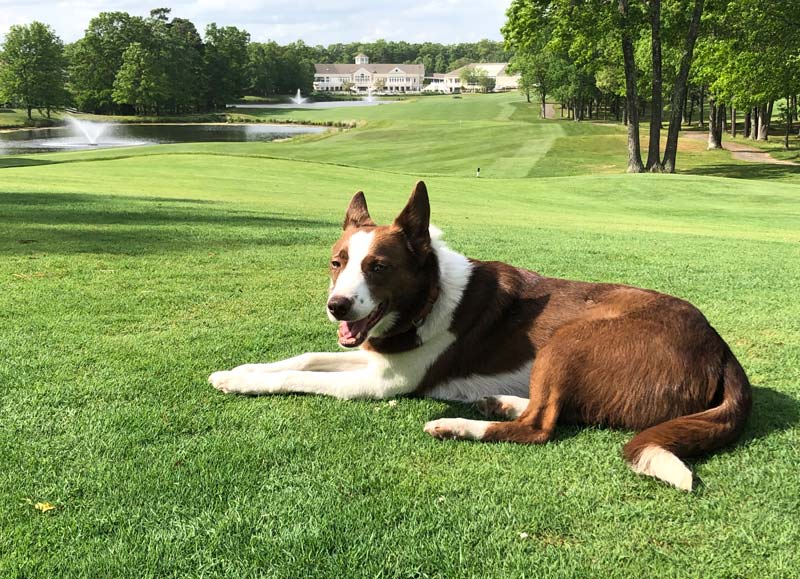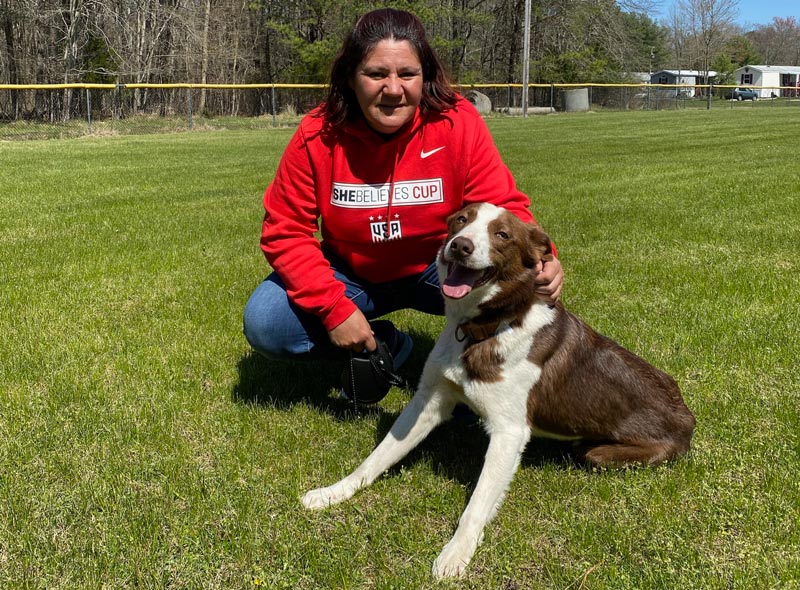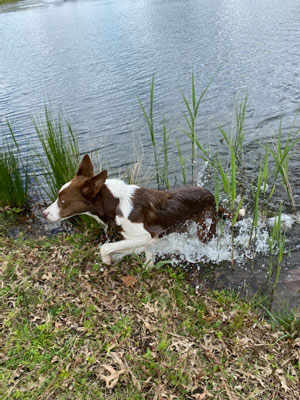
Two-year-old Rusty revels in his new post at Westlake Golf and Country Club in Jackson, N.J., where he’s on goose patrol and has a knack for lifting spirits. Photos courtesy of Jennifer Torres
Not long after border collie Rusty arrived at his new home and job site at Westlake Golf and Country Club in Jackson, N.J., his new mom and boss noticed Rusty had a marked fondness for the course’s water features.
“He loves to swim,” says Jennifer Torres, GCSAA Class A superintendent at Westlake G&CC. “I called Rebecca and told her I was afraid he was going to drown because he spends so much time in the water. She said, ‘Don’t worry. He has plenty of energy.’”
Rebecca Gibson, owner of Flyaway Geese, knows her dogs, and she specifically selected the water-loving — and energetic — Rusty as the perfect match for Torres and Westlake. The three have gotten along, uh, swimmingly since Rusty’s arrival on April 18.
“He’s been phenomenal,” Torres says. “He’s a great dog. He’s awesome. He’s the light at the end of every day.”
At the 2020 Golf Industry Show in Orlando in January, Torres — who has been at Westlake G&CC since October 2019 — entered a raffle to win a free goose dog from Flyaway Geese, a Charlotte, N.C.-based company that since 1997 has trained and sold border collies for use at businesses, airports, military installations and golf courses as a means of humane management of migratory birds. The Flyaway Geese booth and exhibition area has been among the most popular attractions at GIS, and the company has given away five dogs at GIS over the past three years.
Torres says she entered each of the three raffles, the most recent at the urging of her 20-year-old son, Ricardo.
“I thought about it awhile,” says Torres, a 13-year GCSAA member. “I already have a black lab. She’s not trained; she’s the family dog. But I thought it would be great to have a dog that’s trained. My son is getting into the business, and he came with me to show. He said, ‘Come on, let’s enter.’ Everybody loves the puppies at GIS. He entered; I entered. I thought, ‘I never win anything, so I don’t have to worry about coming home and telling my husband I won a dog.’”
Torres was tipped off about her win ahead of the official announcement. Her presence was requested at a specific spot at a specific time on the trade show floor.
“We were looking at each other. I thought, ‘There’s no way we won the dog,’” Torres recalls. “I thought we’d won an iPad or something.”
Instead, she was called up on a small stage to join Gibson and TV personality Lauren Thompson and introduced as the proud new owner of a trained goose dog. Then she had to break the news to her husband.
“The funny thing is, he knew before I told him,” Torres says. “Some friends saw it on Facebook and told him. We have one dog — what’s one more?”
After her win, Torres filled out a questionnaire that allowed Flyaway Geese to find a good canine match for her and her course.

Jennifer Torres, GCSAA Class A superintendent at Westlake Golf and Country Club, with Rusty.
“We try to find the best match based on what their needs are, and we tailor the finishing training for them,” Gibson says. “If a course has a lot of traffic, we may work on teaching (the dogs) to lie down before crossing roads. If there’s a lot of water, we might choose a big swimmer.”
In Torres’ case, Gibson considered the water features and the presence of another dog — 5-year-old Sadie — living in the home, and she settled on 2-year-old Rusty. In the beginning, Sadie was a bit cold to her new brother.
“It was a little shaky at first,” Torres says. “She was used to being the alpha, and now there’s somebody new in the house, and ‘I don’t get to go to work with mom now.’ But they’re doing well now.”
Rusty’s delivery was delayed because of the coronavirus pandemic. Usually, Flyaway Geese delivers a dog and provides training on-site. But Westlake G&CC is in New Jersey, which at the time was one of the COVID-19 hot spots. Gibson found it somewhere between impractical and impossible to provide that service in this case. Torres deemed driving to Charlotte to retrieve Rusty equally impossible. However, Gibson arranged for Rusty to be dropped off as part of a cross-country dog delivery drive, and she worked with Torres virtually.
“We delivered three dogs that way this year,” Gibson says. “It’s crazy. But it worked.”
Via FaceTime, Gibson “worked” a dog as Torres looked on, and they virtually made their way through the handler’s manual.
“I showed her corrections and praising, how it works — how it’s supposed to work — and answered questions,” Gibson says. “For Jenn, it clicked right away.”

Right: Rusty returning from a doggy dip.
Westlake G&CC was closed to golfers at the time because of restrictions brought on by the pandemic. That allowed Torres and Rusty to get acclimated without the distraction of golfers on the 18-hole course.
“It was actually nice having him when we were closed so I could go out and let Rusty run and not have to worry about golfers getting in the way or being afraid of him,” Torres says.
As it turns out, the golfers at Westlake G&CC are quite fond of Rusty, who was the subject of a short article in the community Westlake Journal and has become the bane of any fowl foolhardy enough to set webbed foot on property.
“The members love him,” Torres says. “When I don’t have him with me, they always ask, ‘Where’s Rusty?’ There aren’t a lot of geese on the property now that he’s been here.”
Though Rusty was dispatched to Westlake with the course’s specifics in mind, Torres wants one thing to be clear: “I made sure if, God forbid, I ever leave Westlake, the dog goes with me,” she says.
Top 10 tips for golf course dog safety and success
Rebecca Gibson of Flyaway Geese has been training goose dogs for more than 20 years, and she has placed hundreds of border collies on golf courses across the United States. Whether your canine companion is warding off geese or just keeping crew and customers company, Gibson’s advice below will ensure your dog lives a full, healthy life, no matter the breed.
1. Safely contain your dog when you do not have someone to keep an eye on them.
Do not let your dog run free on the golf course. The reason for this rule is simple: Even with the best dogs, bad things can happen, and if you aren’t present, you can’t prevent things from going wrong. You also can’t correct your dog if they make a bad decision. An example: Your dog is running on the course and comes across some kids playing. The kids decide to chase him around to try to scare him. The dog barks and growls and then bites one of the kids. The dog did nothing wrong — he was provoked — but no one was there to see but the culprits. For containing your dog, I recommend a crate in the office.
2. Keep chemicals away from your dog.
Pesticides and antifreeze can be toxic dogs, and many toxins have a sweet taste that dogs like. Most toxins are fatal if consumed. Store these products in a safe place away from your four-legged friend, and make sure no spills are left uncleaned.
3. Watch for blue-green algae bloom.
Several factors have to be present simultaneously to make blue-green algae bloom a lethal situation for a dog, but if this combination does occur and a dog drinks the water, it can be fatal before you’re able to get the dog to a vet. Blue-green algae bloom is caused by high temperatures followed by cool rain and fertilizer of any kind — even goose poop — in a pond. A mason jar test is a free and easy way to screen a pond for the presence of blue-green algae bloom. Better safe than sorry during hot summer days.
Hear much more from Rebecca Gibson about training dogs for golf course work and her business, Flyaway Geese:
4. Do not allow your dog to run next to your golf cart.
The dog could see squirrels or other animals, get distracted and run in front of the cart. If you do allow your dog to run alongside, teach the dog to run only on one side of the cart.
5. Keep your dog away from equipment that’s running.
Things can be thrown, causing injury, or your dog could run in front of a machine.
6. Teach your dog not to cross streets.
I tell all handlers to teach their dogs from day one not to cross streets without permission. How do you do this? Consistency is crucial. One way is to always have your dog load on to the golf cart before you get to a road. Most dogs will learn after a while that this is just what they need to do. Another option: Teach the dog to lie down at all roads, then use a release command that allows the dog to cross after you’ve checked for traffic. Allow no exceptions. Start with the dog on a leash so that you can enforce the lie-down, then go to a long line so you can stop the dog if necessary. From there, you can move to off-line work.
7. Do not allow your dog to start water-chasing.
Not only can this habit cause your dog to begin digging around sprinkler heads, but consuming too much water at one time can cause water intoxication, which can be fatal.
8. Do not allow your dog to growl or snap at anyone.
Stop this behavior immediately by correcting it in a low, growly tone. Do not respond with anything positive, and do not use a high-pitched voice — all reaction should be negative and in a low tone. This conveys to your dog what’s acceptable and what’s not.
9. Keep your dog up to date on vaccines.
This is especially important for Lyme disease in areas of the country where ticks are a prominent threat. Keep your dog on preventive heartworm medication and monthly flea and tick medication. Additionally, feed your dog a high-quality food. Grain-free feeds are no longer recommended, as they can cause heart issues. A quality dry kibble is great, and high-protein foods are important for working dogs. At Flyaway Geese, we feed Victor dog food, and we always mix water with our feed to avoid bloat. I recommend no table food. Extra weight is bad for joints and overall health — you want to see a waistline on your dog.
10. Insure your dog.
Insurance is easy and inexpensive these days, and it assures you never have to make a decision not to treat because of expense.
Andrew Hartsock is GCM’s managing editor.